Co-Work Space Now Available in White Plains
- Details
- Hits: 6332
 The Digital Arts Experience, a creative learning hub focused on promoting digital literacy, is now offering its state of the art facility as a modern day workplace solution through two simple and affordable plans. Membership costs are less than $10 per day. Located at 170 Hamilton Suite 100 in White Plains, the space is convenient and offers parking.
The Digital Arts Experience, a creative learning hub focused on promoting digital literacy, is now offering its state of the art facility as a modern day workplace solution through two simple and affordable plans. Membership costs are less than $10 per day. Located at 170 Hamilton Suite 100 in White Plains, the space is convenient and offers parking.
Rob Kissner, President, and his team at The DAE recognize that individuals who work out of the home often complain that they miss the social aspect of working in an office around other professionals. Kissner says, "Home Base provides a productive, collaborative, and creative workspace in which professionals can work by side with other professionals without the high overhead costs of a renting an office."
Home Base offers important office amenities such as print/scan/fax and conference rooms, as well as unique features including an on site professional recording studio, photo/video studio, and computer labs equipped with state of the art Apple computers loaded with Adobe CS6 & other pro software. In addition, Home Base has an in house creative team, offering production services in all forms of media, including graphic & web design, video production, audio production and photography.
Kissner is confident that between the low cost membership options, the flexibility of the facility, and the unique amenities, Home Base will provide the ideal workspace solution for creative professionals. To learn more, visit http://www.workhomebase.com.
Coworking is based on the values of collaboration, openness, community and accessibility. Rather than being isolated at home, surrounded by distractions, coworking enables individuals to work side-by-side with productive, professional, creative people. It makes for an environment where ideas are shared freely and establishes a community of active professionals that prefer working, learning, and growing with each other rather than alone.
Learn more by calling 914-227-2221 or visiting http://www.workhomebase.com
To
Friends of Animals Advocates a Humane Solution to Geese Control
- Details
- Hits: 4675
 This letter was sent to Scarsdale10583 by Edita Birnkrant of Friends of Animals: Friends of Animals, an international animal advocacy organization founded in NY State in 1957 has received many calls and emails from upset and concerned Scarsdale residents over the town officials' plans to roundup and slaughter the geese at the pond behind the library. In recent days we've put out action alerts to our members and supporters, sent out a press release and contacted local officials in response to the wrong-headed, intolerant scheme.
This letter was sent to Scarsdale10583 by Edita Birnkrant of Friends of Animals: Friends of Animals, an international animal advocacy organization founded in NY State in 1957 has received many calls and emails from upset and concerned Scarsdale residents over the town officials' plans to roundup and slaughter the geese at the pond behind the library. In recent days we've put out action alerts to our members and supporters, sent out a press release and contacted local officials in response to the wrong-headed, intolerant scheme.
Last Friday I had a private meeting with Village Manager Gatta and also spoke to Jason Marra, Asst. Superintendent of Recreation, urging them to adopt the non-violent, proven strategies such as habitat and landscape modification at the pond and surrounding area, in addition to adopting policies and strategies to simply clean up goose droppings and foster tolerant attitudes towards geese and wildlife.
I presented both Gatta and Marra with several copies of Friends of Animals' informative Canada Goose Habitat Modification Manual, written by renowned ornithologist Don Heintzelman. The manual contains examples of successful scenarios in suburban and urban areas in which habitat modification, public education and fecal cleanup plans resulted in an end to the perceived conflicts between humans and Canada geese. The manual details this process. None of these strategies had even been considered by Scarsdale officials, but now they have been made to understand that killing geese and/or continually harassing them out of the pond area will not work, as more geese will merely replace the killed or chased geese, thus being counter-productive financially and as a practical matter.
Goose roundups are monstrous. USDA agents typically enter the pond area during early morning, roughly separating goslings from parents, and then stuff the bound, panicked geese and babies into crates. Next, the geese are gassed or shot to death. It was stressed to Gatta that removing the geese from the pond area will create a vacuum that will be filled as more geese are drawn back to the landscape, unless changes are made. Geese are attracted to areas with short, mowed grass with open sight lines as safe nesting areas. Growing grass longer in areas, planting native shrubs and trees to block sight lines (geese like to watch for predators), will deter geese from ponds, shores and parkland -- reducing the time they spend in any one spot.
Village Manager Gatta informed me during our meeting that he will not be signing a kill contract with the USDA, and that he is in the process of writing a memo that will include new, respectful ways of dealing with the geese in Scarsdale, as a result of our advocacy and the outcry from local residents and from others around the country. Within two weeks Gatta will be conferring with the Superintendent of Parks (and presenting the memo) with a plan of action regarding the geese, but it seems that killing is off the table now—a big victory for advocates and local residents, and the geese. Friends of Animals intends to keep the pressure on Scarsdale officials until we are fully assured that Canada geese will be spared a senseless and mean-spirited slaughter and harassment campaign.
The message was made very clear to Gatta: Habitat and landscape modification are the only environmentally sound and long-term ways to deter geese from areas where they are seen as problematic, and that's clearly what's needed in Scarsdale. Co-existence with geese and other wildlife is required as a part of civilized suburban living,
Edita Birnkrant
NY Director
Friends of Animals
1841 Broadway, Suite 350
New York, N.Y. 10023
www.friendsofanimals.org
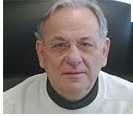 We asked Village Manager Al Gatta to comment on the letter, and here is what he shared: "Edita has carried our conversation a little too far, but we did meet and discussed habitat change and the manual she dropped off looked to be very helpful. We are now looking at some of the alternatives, but no final decision has yet been made. The contract with the USDA Wild Life has not been signed and we are again looking at that method along with a few others. No final decision has been made, but it may be worth one more try with alternative measures."
We asked Village Manager Al Gatta to comment on the letter, and here is what he shared: "Edita has carried our conversation a little too far, but we did meet and discussed habitat change and the manual she dropped off looked to be very helpful. We are now looking at some of the alternatives, but no final decision has yet been made. The contract with the USDA Wild Life has not been signed and we are again looking at that method along with a few others. No final decision has been made, but it may be worth one more try with alternative measures."
Con Ed Representatives Meet with Scarsdale's Leaders
- Details
- Written by: Joanne Wallenstein
- Hits: 4136
 I don't know about you, but after eleven days without power during Hurricane Sandy, I thought someone would answer for Con Edison's failure – or at least force them to provide a disaster plan for the next storm. That's why I was pleased when I learned that the Scarsdale Board of Trustees had sent a strongly worded letter to the utility requesting a meeting to address the Village's concerns -- and marked my calendar to attend the powwow on January 23rd.
I don't know about you, but after eleven days without power during Hurricane Sandy, I thought someone would answer for Con Edison's failure – or at least force them to provide a disaster plan for the next storm. That's why I was pleased when I learned that the Scarsdale Board of Trustees had sent a strongly worded letter to the utility requesting a meeting to address the Village's concerns -- and marked my calendar to attend the powwow on January 23rd.
To their credit, Con Edison did respond to the letter and sent five representatives to a meeting at Scarsdale Village Hall on 1-23 to answer questions about their performance during the storm and discuss the future. Coincidentally, the meeting was held just one day after the Scarsdale Board of Trustees passed new code to ease the way for the installation of permanent standby generators. And after attending the meeting with Con Edison, I am convinced that we all need to install one.
Tony Suozzo, Con Ed's General Manager of Electric Operations explained that the magnitude of Hurricane Sandy was unprecedented, with 334,0000 Westchester customers out of a total of 347,0000 out of service. Hurricane Irene, the second worst storm to date, put 105,000 customers out, so Sandy affected triple the number of users. Since the storm spanned a 1,000-mile radius, other utility companies who usually share resources, were not willing to release their teams, leaving Con Ed to manage the restoration with limited crews. Customarily Con Edison of Westchester shares crews with New York City and the boroughs, but due to the damage there, Con Edison crews in the city were in demand.
To get an idea about what it takes to service Westchester, Con Edison said that they have 48 overhead construction crews in Westchester to serve 39 municipalities. They also have a few private crews. However, they are heavily reliant on other utilities during crises. For instance, during Hurricane Irene they used 600 crews to repair the lines.
Turning to the specific questions posed in the letter from the Scarsdale Board of Trustees, Jon Mark asked Con Edison if they would be willing to share the map of the Scarsdale power grid to allow the Village Department of Public Works to make an assessment even before Con Edison arrives. Con Edison said that they are working on creating maps of feeders and branch lines that they can distribute to municipalities and promised to provide the map to the Village within a month.
Next was staffing. During Sandy, Scarsdale was assigned only one crew to de-energize power lines so 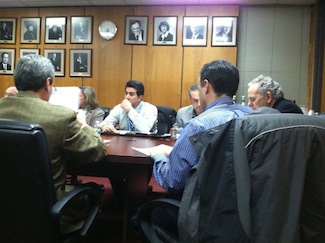 that restoration work could be done. Trustee Mark asked if local electricians could be trained to de-energize lines and Con Edison said that they "needed to follow through on this." They offered no timeline on the process.
that restoration work could be done. Trustee Mark asked if local electricians could be trained to de-energize lines and Con Edison said that they "needed to follow through on this." They offered no timeline on the process.
On timing, Mayor Flisser asked if it was standard for Con Edison not to send help after the first four days of the storm, as has been her experience since she began serving on the board. In response, the Con Edison team looked surprised, and said, "it is not our goal." They told the group that they assess where they can bring back the largest numbers of customers first and also respond to hospitals and nursing homes before working in areas with single-family homes.
Trustees also complained that there was no coordination between the Con Edison liaison and the Village staff to prioritize road clearing and restoration work. In fact, according to Deputy Village Manager Steve Pappalardo, during Hurricane Sandy the liaison did not know what was going on or what the work schedule was for the day. The Con Ed team told Village Managers that they should be able to dictate where the crews go in Scarsdale and promised to introduce a new team of muni managers who could work with the Village.
The conversation turned to communications, and Trustees discussed the inadequacies of the Con Edison customer service website which was often inaccurate and provided everyone with the same restoration date. This left the Mayor and the staff at Village Hall to answer for Con Edison and they manned thousands of calls from cold customers.
The Con Edison team admitted that their customer service system and website was inadequate and needs to be revamped. They said, "they are focused on improving it."
What can be done:
According to Con Edison, the only way to fix the problem is to put the wires underground or cut the trees so that they don't bring down the wires. They are now studying burying the lines but claim that the cost would be $7 to $9 million a mile, a great deal more than the $1 million a mile figure that was originally quoted.
Since the storm, Con Edison has kept some of the extra crews in Westchester to fix low wires, repair poles and trim or take down trees. They say that this work is now 80% complete. Though they used to cut back trees six feet away from the wires, they are now using 10-15 foot clearances.
The meeting ended with promises of:
- A visit from the new muni liaison team
- A long-range plan on burying wires underground
- Work on Con Edison's communications system
- A future meeting to discuss action plans
It was starting point, but there was no assurance that Con Ed is any better prepared how then they were in November.
My recommendation? If you have the funds and can get Con Edison to come to your house to install a gas line, buy your own generator. It will surely be put to good use!
At Home in Scarsdale: A Dynamic Program for Scarsdale's Seniors
- Details
- Hits: 3809
 Attention older adults ... At Home in Scarsdale Village, sponsored by Scarsdale § Edgemont Family Counseling, is an aging in place, membership-based organization for adults over the age of 60 which promotes friendship, connection, socialization, and independence. With their own transportation van and driver, At Home in Scarsdale Village offers members support, cultural and educational programming, referral service, and transportation to and from essential errands. At Home members are afforded the comfort of a spacious van and an experienced driver in which to ride on weekly group outings which may include NYC museums, plays, as well as local Westchester events. The best part about the trips is the friendships that form while on the van. Members are able to talk to each other about their families, their hobbies, and travels. People recognize each other from trip to trip, but even better, warmly welcome new members.
Attention older adults ... At Home in Scarsdale Village, sponsored by Scarsdale § Edgemont Family Counseling, is an aging in place, membership-based organization for adults over the age of 60 which promotes friendship, connection, socialization, and independence. With their own transportation van and driver, At Home in Scarsdale Village offers members support, cultural and educational programming, referral service, and transportation to and from essential errands. At Home members are afforded the comfort of a spacious van and an experienced driver in which to ride on weekly group outings which may include NYC museums, plays, as well as local Westchester events. The best part about the trips is the friendships that form while on the van. Members are able to talk to each other about their families, their hobbies, and travels. People recognize each other from trip to trip, but even better, warmly welcome new members.
During Hurricane Sandy, the Youth Outreach Team at SFCS called on many At Home members and used the van to visit members who could not be reached and help those who were stranded by the storm. One of the members recently remarked on how important that phone call was to her in the aftermath of the storm. She said she felt good about At Home and the people who are a vital part of the organization.
As most veteran members know, trips are just a small part of what At Home in Scarsdale Village does in the community. The monthly discussion group, Life, held the second Tuesday of each month, is an important opportunity for members to support each other, offer advice about anything and everything from home improvement to moving companies, and provide a safe expression of life's many challenges. The discussion is often headed by a guest speaker from the area. These talks are about everything and anything from finances, estate planning, and current events to sculpture and more. The next discussion group is scheduled for February 12 from 1-2 pm and the topic will be home safety.
"Healthy Aging in Place Book Discussion" will begin Wednesday, March 20, 2013 from 3-4 PM This will be a bi-monthly talk about a book, fiction or non-fiction, on topics of living and aging. The first book will be Scarsdalian Alex Witchel's book, All Gone. Other books discussions will include Far From the Tree: Parents, Children and the Search for Identity by Andrew Solomon and Behind the Beautiful Forevers: Life, Death, and Hope in a Mumbai Undercity by Katherine Boo. Book discussions will take place approximately every 8 weeks in Room 303 of The Harwood Building.
For membership information and a full calendar of events, contact Susan Gilbert at (914) 723-4529 or sgilbert@sfcsinc.org.
At Home in Scarsdale Village Winter 2013 Calendar
January 30: Jacob Burns Film Center, Senior Movie Matinees, 1:00 p.m.
January 3: Metropolitan Museum of Art
February 12: Life Changes
February 14: Westchester Broadway Theater, In The Heights
February 20: Guided Tour of United Nations
February 27: Museum of Arts and Design
March 20: Healthy Aging in Place Book Discussion
April 10 or 17: Jacob Burns Film Center, Senior Movie Matinees, Jewish Film Festival
Cheerleaders Shine at Weekend Tournament at SHS
- Details
- Hits: 4225
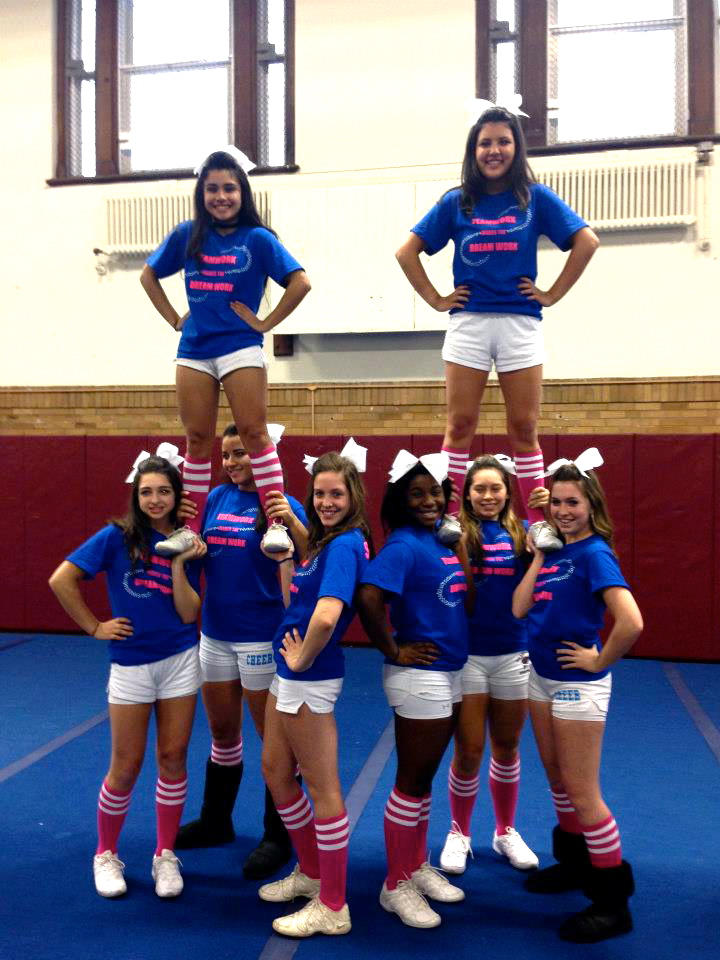 The Scarsdale Cheerleaders hosted their eighth annual cheerleading competition at Scarsdale High School on Saturday, January 12th. About 30 teams from Westchester County, the Bronx, Putnam County and Pennsylvania participated. The competition was a fundraiser for the high school cheerleading program, helping to send both their JV and Varsity teams to compete at the Nationals Championships in Orlando, Florida the weekend of February 8, 2013.
The Scarsdale Cheerleaders hosted their eighth annual cheerleading competition at Scarsdale High School on Saturday, January 12th. About 30 teams from Westchester County, the Bronx, Putnam County and Pennsylvania participated. The competition was a fundraiser for the high school cheerleading program, helping to send both their JV and Varsity teams to compete at the Nationals Championships in Orlando, Florida the weekend of February 8, 2013.
This year's Scarsdale Varsity team is lead by captains Taylor Doyle and Ali Levy and dominated by seniors.
According to Coach Stacy Monteiro, "Having mostly seniors this year and many of them who have been on Varsity since they were freshman their attitudes, work ethic and skill level is much better this year than in previous years so they have productive practices, work harder and compete better. They have also been scoring much higher on their score sheets, placing in the top 3 at competitions except for regionals. This current team took 5th place out of 18 teams at the Northeast Regional Qualifier for Nationals. Both our JV and Varsity teams will attend the Nationals championships in Orlando from Feb. 7th - 11th."
Here's a list of the teams that participated on Saturday:
Those in bold were winners in their divisions: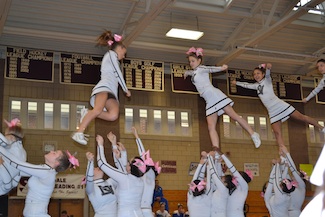
Ardsley
Delaware Valley
Eastchester
Good Counsel
Gorton
Harrison
Our Lady of Assumption
Mount Vernon
Portchester
Preston
RC Ketcham
Stars Youth
St. Catharine's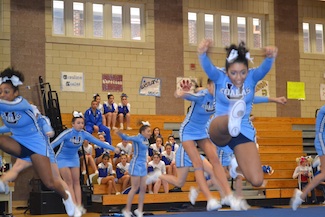 St. Francis Xavier
St. Francis Xavier
St. Theresa's
Ursuline
Walton
Westlake

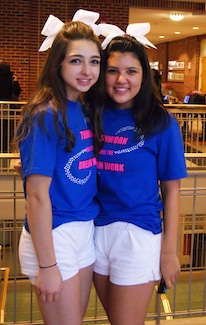
Photos contributed by Mary Blum and Sunny Feinstein







